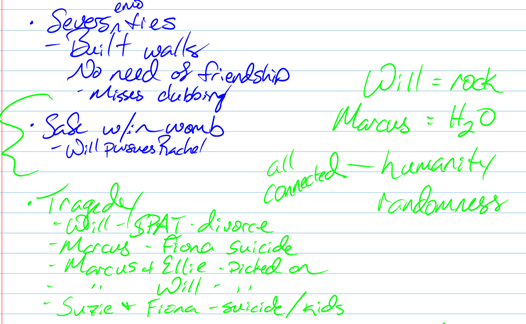If, for some reason, you have chosen to write an essay instead of creating a screenplay, you must choose from one of these two topics:
- If the arrival of the messenger is equivalent to R&G’s birth, what is the meaning and purpose of their life, which is shown in its entirety?
- Contrast the player’s comments about death with Guil’s.
Also, please let me (and your group mates) know that you will be writing this instead of participating in the project.
Post ’em below. We already have:
- R&G ’08
- R&G are Undead (See Josiah’s post for a very long video on why we can’t do this one…)
If you don’t come up with an original idea, begin working on a point, that is, a reason, for writing one of the above. Partial ideas are okay, as we are just in the beginning stages. I want to see something from everyone tomorrow, though.
Among other things, we have been discussing Hamlet’s state of mind—whether he be "put[ting] an antic disposition on" (I.v) or be truly mad.
We will continue with this discussion on Wednesday (I will be out 3rd hour tomorrow). For now, read over Hamlet’s soliloquy from the end of Act II. The full text is here. To find the passage, search (hit "ctrl+F) for "Hecuba" and go to the second instance.
All homework from this semester is due by this Thursday (the 18th). I will not accept any late work after this. If you need help with an assignment, or would like me to edit it once before you turn it in, please turn it in tomorrow.
We began our study of Shakespeare’s Hamlet and Tom Stoppard’s Rosencrantz and Guildenstern are Dead with a discussion of . . . The Wizard of Oz. All of you were familiar with the story (or the Garland movie, at least), and most had read Wicked, the novel-turned-play by Gregory Maguire. In the same way that Maguire tore apart the story of The Wizard of Oz then rebuilt it in a new form as Wicked, Tom Stoppard (in 1966) reconstructed a classic play into Rosencrantz and Guildenstern are Dead, a postmodern, existentialist performance.
To better understand what the authors have done with the original works, we watched this commercial for the Kia Borrego, comparing it to a number of "normal" commercials.
Your assignment for tonight is to look over Hamlet’s soliloquy after Claudius and Gertrude leave him. Notes are always a good thing (might use your journal), but you will not turn anything in. As you read it, keep in mind the following questions:
- What has caused him to feel this way?
- What is Hyperion? A satyr? Why is he comparing these things?
- Who is Niobe?
- What are we to make of "Frailty, thy name is woman"?
O, that this too too solid flesh would melt
Thaw and resolve itself into a dew!
Or that the Everlasting had not fix’d
His canon ‘gainst self-slaughter! O God! God!
How weary, stale, flat and unprofitable,
Seem to me all the uses of this world!
Fie on’t! ah fie! ’tis an unweeded garden,
That grows to seed; things rank and gross in nature
Possess it merely. That it should come to this!
But two months dead: nay, not so much, not two:
So excellent a king; that was, to this,
Hyperion to a satyr; so loving to my mother
That he might not beteem the winds of heaven
Visit her face too roughly. Heaven and earth!
Must I remember? why, she would hang on him,
As if increase of appetite had grown
By what it fed on: and yet, within a month–
Let me not think on’t–Frailty, thy name is woman!–
A little month, or ere those shoes were old
With which she follow’d my poor father’s body,
Like Niobe, all tears:–why she, even she–
O, God! a beast, that wants discourse of reason,
Would have mourn’d longer–married with my uncle,
My father’s brother, but no more like my father
Than I to Hercules: within a month:
Ere yet the salt of most unrighteous tears
Had left the flushing in her galled eyes,
She married. O, most wicked speed, to post
With such dexterity to incestuous sheets!
It is not nor it cannot come to good:
But break, my heart; for I must hold my tongue.


